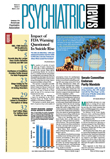When individuals experience auditory hallucinations, the primary auditory cortex seems to be involved.
Yet the question remains as to how.
For some time now, it has been known that when a person pays attention to external sounds, the electrical activity of neurons in the primary auditory cortex increases, and that, conversely, when a person's attention is distracted from external sounds, then electrical activity of neurons in this brain region decreases. So Daniela Hubl, M.D., of the University Hospital for Clinical Psychiatry in Bern, Switzerland, and colleagues hypothesized that if the electrical response of primary auditory cortex neurons increases during auditory hallucinations, then it is a nonspecific auditory response to those hallucinations, but if the electrical response of those neurons during hallucinations decreases, the electrical response is a constituent of the hallucinations per se.
They tested their hypothesis on seven individuals who experienced periodic auditory hallucinations even though the individuals were on antipsychotic medications. Subjects sat in a slightly darkened room in a comfortable resting position. External auditory stimuli (tone pulses) were presented to both ears of each participant by insert phones for about eight minutes. During that time participants were also instructed to listen for their inner voices and to indicate the beginning as well as the end of them by pressing a button. Throughout the recording period, the electrical activity of primary auditory cortex neurons was measured in each participant with an electroencephalogram.
Hubl and her group then compared the electrical response of primary auditory cortex neurons during hallucinations with the response of those neurons during nonhallucination periods. In each subject the scientists found a statistically significant reduction in neuronal electrical response during hallucinations compared with the response during nonhallucination periods.
So, since there was a decrease rather than an increase in primary auditory cortex activity during hallucinations, this activity was an actual constituent of those hallucinations, the researchers concluded in the January British Journal of Psychiatry.
Moreover, they reported, the decreased primary auditory cortex activity during hallucinations was localized mostly to the left side of the brain. The left auditory cortex is known to be an essential part of the brain's language system, which further encompasses Wernicke's area and the motor speech areas of Broca, as well as their interconnections.
The study was funded by the Swiss National Science Foundation.
